by Leslie Layton / commentary
posted Jan. 15
A settlement agreement in the lawsuit related to the city’s treatment of unhoused people, signed Friday by a federal judge, could end the spectacle of chaotic mass evictions that stranded campers who had nowhere to go.
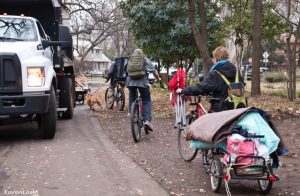
Early last year, a newly-installed City Council began a series of sweeps in parks, near waterways and on patches of grass on public land.
Journalists watched as workers came in atop tractors, rumbling through encampments where displaced people had pitched tents and had failed to move their few belongings to who knows where – until we weren’t allowed to watch.
I remember the woman standing outside her tent under the Highway 99 overpass in Lower Bidwell Park, barefoot, politely putting up with my interview, who then asked me if there was any way I could get her a new pair of socks.
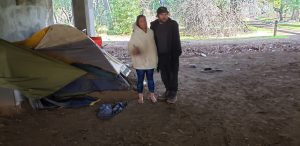
Hoovervilles. That was what came to my mind as I looked at the encampments during those sweeps. The thing is, we weren’t in the midst of the Great Depression when encampments were so-called “Hoovervilles,” and like a lot of other people in Chico, I felt like the sweeps reflected badly on what we had become. And I hadn’t yet “met” Stefan Gilkerson, father of Bryce Hodge, who passed away on June 16 of last year after living in Chico’s parks.
Homelessness death toll
Hodge was one of 24 people, who in the last 14 months, have died outside or as a result of living unhoused outside, said Charles Withuhn, who leads the grass-roots North State Shelter Team.
In April, eight unhoused plaintiffs, represented by Legal Services of Northern California and later the Western Center on Law & Poverty as well, filed suit against the City of Chico and Chico Police Department, alleging they had “unlawfully enforced a citywide web of local laws that imposed criminal penalties” on the homeless. The suit alleged the ordinances were in violation of Constitutional amendments.
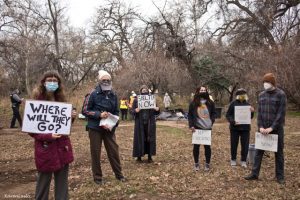
Judge Morrison C. England, Jr., signed the agreement about 4:30 p.m. Jan. 14, transforming it into a court order — despite an onslaught of emails from 16 Chico citizens that same day asking him to delay finalization. A letter on city letterhead signed by Vice Mayor Kasey Reynolds also asked the judge to postpone signing and was attached to a Jan. 14 email. The emails were obtained via a Chico resident who accessed the court docket.
Reynolds had not yet responded to email asking for comment when this column was posted. “I do not believe that the contents of this [settlement agreement] document were fully disclosed and or correctly explained …,” states Reynolds’ letter.
Outreach
The settlement doesn’t solve the crisis in emergency or transitional housing, but it does require humane treatment of homeless people. The settlement creates an opportunity for outreach, so that unhoused people get referrals to services and shelter beds before they’re approached by cops and told to move somewhere else, or worse yet, cited.
In April, I wrote about how lead plaintiff Bobby Warren had been entrapped by the city’s web of ordinances that criminalize homelessness, poverty and displacement. According to the settlement, there are six such cases against him.
“This settlement includes common sense solutions that many … community members have pushed for as the City’s affordable housing crisis has worsened, pushing more and more people outside,” said Sarah Steinheimer, the lead counsel for the plaintiffs, in a Legal Services press release.
The city will have to erect up to 177 pallet shelters at what was the BMX site. There has to be toilet and bathing facilities and access to laundry service and food. The Jan. 14 press release quotes plaintiff Tona Peterson on what it means to have access to food, water and basic amenities.
“As a woman living outside since losing my home over three years ago in the Camp Fire, I have not been able to sleep at night because I feared for my safety and because of the cold,” Peterson said. “I and many others living outside will now have a private space with a locking door and heat. I’ll be able to get more things done each day and work with the on-site services. We all will.”
The settlement requires that individual assessments be conducted with “outreach and engagement staff” — i.e., social workers — before evictions to determine if there is appropriate shelter space for each unhoused person. The outreach staff must be trained in providing “trauma-informed care.”
Law enforcement officers “may be present at the general location” during an individual assessment but must remain far enough away to ensure a private conversation is possible. In other words, the officers, if present, shouldn’t be seen as threatening. The settlement seems to acknowledge that social workers and police have different sets of skills, that homelessness is often not a lifestyle choice but a social/structural problem.
A father’s search for closure
As a reporter covering homelessness last year, I received a call one autumn morning from a man who identified himself as Stefan Eagle Gilkerson in Reykjavik, Iceland. That Gilkerson, father of the late Bryce Hodge who had spent months in Chico unhoused, had resorted to calling a ChicoSol journalist struck me as a chilling statement on the lack of resources available.
Gilkerson was on a quest for closure, in despair that no one in Chico could tell him how his son ended up homeless, and had already contacted the Chico Enterprise-Record, Chico police and city leaders. I listened to his story for a couple of minutes and then Gilkerson broke into sobs. He called back a day or two later when he had more composure.
Hodge had told his father that he had attended Chico State, and Gilkerson said Hodge had lived in Japan at one point. Suddenly, Gilkerson said, his son seemed to “drop off the face of the earth.”
About two years ago, Gilkerson, an information systems project manager, became worried about Hodge and their lack of contact and asked the Chico Police Department to attempt to locate his son and conduct a welfare check. His son had heart trouble, but Gilkerson never imagined that he was also unhoused and struggling with addiction.
Gilkerson never heard back from Chico PD. As a result of his son’s tragic death, he says he learned something about homelessness in Chico: that there isn’t a great enough effort to contact families of unhoused people who might be able to help.
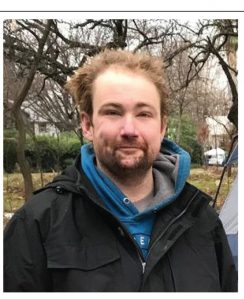
Since his son’s death, Chicoans have sent Gilkerson pictures of Hodge talking to a police officer during a sweep. He wonders if it occurred to that officer to conduct a check that would have shown his father was looking for him. “If they had done that one thing, it would have given me the opportunity to see that he was in trouble and get him to Iceland,” Gilkerson said.
Iceland, he added, has a more accessible health care system and Hodge could have been treated for both his addiction and heart problem.
The settlement agreement leaves room for moving unhoused people from parks and greenways, but only after steps are taken and alternatives are made available. If unhoused people turn down shelter that is appropriate, they may have to move. But the agreement is written to provide time to sort that out with the engagement of social workers and legal representatives. And in closing down encampments, the city will have to direct campers to alternative sites if no shelter space is available.
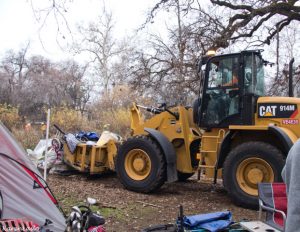
Within 30 days, the city also has to dismiss administrative and criminal citations against the plaintiffs that are related to their unhoused status.
Significantly, the settlement agreement appears to break no new ground. What it does is create a “process based on court decisions and settlements” that have been made since the 2018 case of Martin v. Boise, said attorney Cory Turner of Legal Services in Chico. That case resolved a lawsuit against the city of Boise, Idaho, related to homelessness.
In other words, the settlement demands that this city do what many other cities are doing – that it take some responsibility for a problem that it didn’t solely create but that will certainly continue to grow as climate disasters strike and as the gulf between wealth and poverty grows.
Getting here has been expensive, even if the road was there well before the lawsuit. The city must pay the plaintiffs a total of $12,000 – that’s $1,500 per plaintiff — and $650,000 to cover the costs of the attorneys who filed suit.
None of us liked the massive encampment that had sprawled throughout Lower Bidwell Park at the beginning of the pandemic, when tent after tent popped up next to the creek. A City Council that was then more progressive was trying to follow CDC guidelines and not force people to move around in a pandemic. Who knew then that the pandemic would last for years? Yet, many of us worried about both the people and the creek.
Bryce Hodge’s father is convinced that Chico police knew his son. His last conversations with Hodge were as Hodge lay dying at Enloe Medical Center, as meth dissolved his organs and he bled profusely. Gilkerson wonders if Hodge was self-medicating because his heart condition had gone untreated.
After Hodge passed, Gilkerson flooded the City Council and Chico Police Department with email, trying to find out if anyone had tried to help his son or get him services. When he called Chico police, an officer told him he’d need a subpoena from a judge to access information the department apparently had. Gilkerson was left feeling frustrated and angry.
Journalists and activists who interacted with Gilkerson’s son describe Hodge as a gentle and kind man. Guillermo Mash, in an August 2021 letter to the Chico ER, said Hodge, when they first met, identified as a “recovering addict” and hoped to get into the Torres Shelter. “During the early months of the pandemic he helped folks sign up for benefits with a small computer tablet he had. He was soft spoken, polite and intelligent,” Mash wrote.
A “small step”
The settlement agreement won’t solve all Chico’s problems with homelessness; there are hundreds of unhoused people in this community. Withuhn said though that it’s a “small step” toward addressing “the most urgent crisis of our lifetime.”
As I read the agreement, I wondered if Hodge might have survived had there been an “outreach and engagement” social worker in contact with him. At the least, perhaps his father could have found comfort and closure by calling a social worker instead of a journalist who had never met Bryce Hodge.
Leslie Layton is editor of ChicoSol.

Leslie Layton, ChicoSol editor: Your story on how Bryce Hodge died was one of the most poignant I’ve read on the plight of the un-housed in Chico. It was painful to read how Bryce’s father tried in vain to find out what happened to his son and didn’t get any help from the city or the police dept. ChicoSol is a valuable source of news for our town. Thank you.
I can relate to the comments of the father of Bryce Hodge, Stefan Eagle Gilkerson. Mr. Gilkerson feels he was blown off and dismissed by Chico PD staff because Bryce was homeless and therefore was not their problem to assist the father in saving the life of his son. I can’t prove it but I believe my son Tyler was profiled as a homeless, transient, throw-away person by the CPD officers involved in his violent killing.
The settlement by Judge England is now the law and I say the judge’s decision to limit the interaction of CPD and law enforcement is a de facto confirmation of my belief that CPD and local law enforcement are not trained or inclined to be compassionate with the homeless. Remember the killings of Desmond Phillips, Tyler, and Stephen Vest. The involvement of law enforcement with the homeless is now strictly at the discretion of the Outreach and Engagement staff. The judge is right on.
The settlement requires that law enforcement officers, and hopefully scantily trained armed private guards, “may be present at the general location” during an individual assessment but must remain far enough away to ensure a private conversation is possible. In other words, the officers, if present, shouldn’t be seen as threatening. The settlement seems to acknowledge that social workers and police have different sets of skills, that homelessness is often not a lifestyle choice but a social/structural problem.
Now I hope all the stakeholders will follow the law and spirit of Judge England’s ruling which is chock full of long-needed common sense solutions.
Great reporting, thanks for telling us this story of Bryce’s struggles and his father’s pain and efforts to help him.
This settlement is very, very exciting news. We have needed this for so very long in Chico.